
Donald Trump, calling Dan Gilbert a “great friend” and supporter, has helped turn downtown Detroit into “Gilbertville.”
How a tax break to help the poor went to NBA owner Dan Gilbert
Dan Gilbert’s cultivation of the Trump family appears to have paid off with Trump tax law breaks : Three swaths of Detroit were selected as opportunity zones under the Trump tax law
*********************************************************************************
 VOD EDITOR: This well-researched story from Pro Publica focuses on Dan Gilbert’s relationship with the Trumps, which handed Gilbert tax breaks to build his empire in Detroit, but Gilbert had equally strong ties with the previous Obama administration. Those ties led up to the Emergency Manager takeover of Detroit and the subsequent bankruptcy filing which devastated the country’s largest Black majority city. For background on the ProPublica story, read VOD’s earlier story on Gilbert’s financial crimes under Obama, at http://voiceofdetroit.net/2013/09/11/dennis-archer-former-consultant-to-detroit-lender-ubs-ag-meets-with-top-obama-aides-execs/
VOD EDITOR: This well-researched story from Pro Publica focuses on Dan Gilbert’s relationship with the Trumps, which handed Gilbert tax breaks to build his empire in Detroit, but Gilbert had equally strong ties with the previous Obama administration. Those ties led up to the Emergency Manager takeover of Detroit and the subsequent bankruptcy filing which devastated the country’s largest Black majority city. For background on the ProPublica story, read VOD’s earlier story on Gilbert’s financial crimes under Obama, at http://voiceofdetroit.net/2013/09/11/dennis-archer-former-consultant-to-detroit-lender-ubs-ag-meets-with-top-obama-aides-execs/

Partners in corrupt Detroit financial management under Pres. Barack Obama, including (r to l) former Mayor Dennis Archer, billionaire investor Dan Gilbert, and former Gov. Rick Snyder. Snyder initiated Michigan’s Emergency Manager laws which led to the takeover of Detroit and other majority-Black cities in the state. Snyder appointed Kevyn Orr as Detroit’s EM; Orr promptly led the city into the disastrous Detroit bankruptcy filing of 2014. Pres. Barack Obama and U.S. Atty. General Eric Holder remained silent despite the pleas of the late U.S. Congressman John Conyers and others as this attack on the nation’s largest Black majority city was unleashed.
*********************************************************************************
Jeff Ernsthausen and Justin Elliott, ProPublica
Published 6:14 p.m. ET Oct. 24, 2019 | Updated 11:33 a.m. ET Oct. 25, 2019
Billionaire Dan Gilbert has spent the last decade buying up buildings in downtown Detroit, amassing nearly 100 properties and so completely dominating the area, it’s known as Gilbertville. In the last few years, Gilbert, the 57-year-old founder of Quicken Loans and owner of the Cleveland Cavaliers, has also grown close to the Trump family.

Ivanka Trump joins Dan Gilbert at 2017 forum on computer science development.
Quicken gave $750,000 to Trump’s inaugural fund. Gilbert has built a relationship with Ivanka Trump, who appeared at one of his Detroit buildings in 2017 for a panel discussion with him. And, last year, he watched the midterm election returns at the White House with President Donald Trump himself, who has called Gilbert “a great friend.”
Gilbert’s cultivation of the Trump family appears to have paid off: Three swaths of downtown Detroit were selected as opportunity zones under the Trump tax law, extending a valuable tax break to Gilbert’s real estate empire.
Gilbert’s relationship with the White House helped him win his desired tax break, an email obtained by ProPublica suggests. In February 2018, as the selection process was underway, a top Michigan economic development official asked her colleague to call Quicken’s executive vice president for government affairs about opportunity zones.
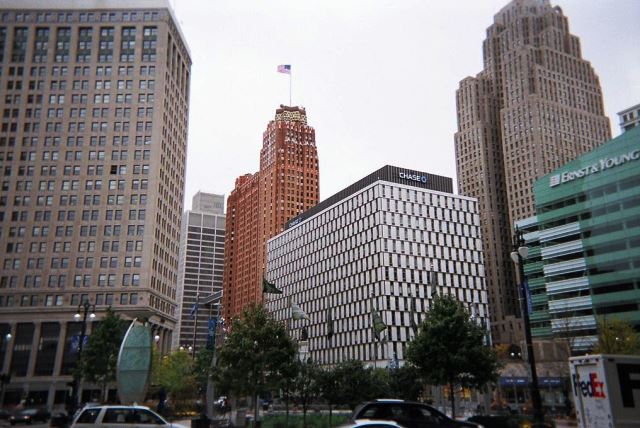
Campus Martius Park with white Chase Building/Quicken Loans HQ in rear center, both owned by Dan Gilbert.. Ernst & Young (r), a global professional services firm with $36.9 billion in revenue, played major role in disastrous Detroit bankruptcy filing in 2014, which stripped city of all its public assets.
“They worked with the White House on it and want to be sure we are coordinated,” wrote the official, Christine Roeder, in an email with the subject line “Quicken.”
The exact role of the White House is not clear. But less than two weeks after the email was written, the Trump administration revised its list of census tracts that were eligible for the tax break. New to the list? One of the downtown Detroit tracts dominated by Gilbert that had not previously been included.
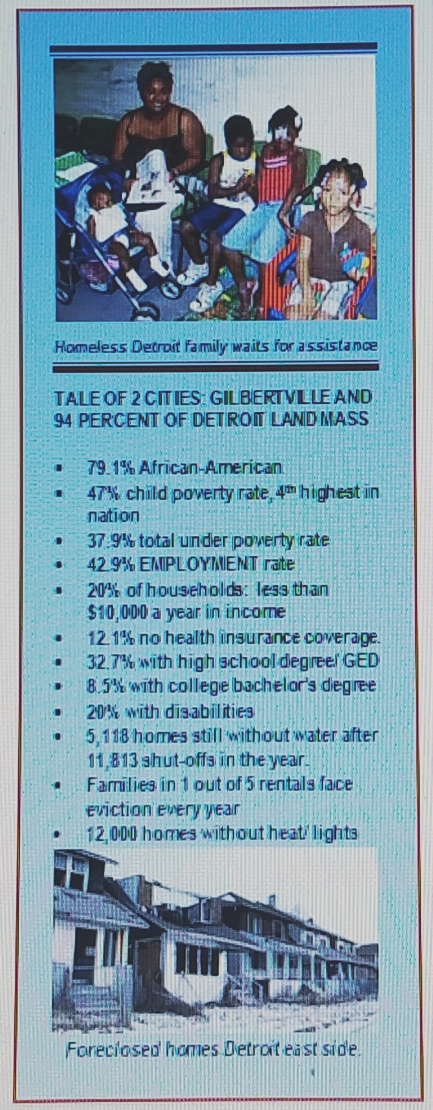
Wall Street bond ratings agency said only six percent of Detroit land mass is eligible for triple AAA rating, warned of condition of rest of city.
And the area made the cut even though it did not meet the poverty requirements of the program. The Gilbert opportunity zone is one of a handful around the country that were included despite not meeting the eligibility criteria, according to an analysis by ProPublica.
Several weeks later, the Michigan governor selected all three of the downtown Gilbert tracts for the program.
Gilbert influenced the local selection process, as well, other emails obtained by ProPublica show: Quicken’s top lobbyist was so enmeshed in the process, his name appears on an opportunity zone map made by the city economic development organization, recommending part of downtown be included in the tax break. No other non-city officials are named on the document.
The result has likely been a boon to Gilbert: Multiple studies have found that property values in opportunity zones increased because of the tax break. Gilbert has put an estimated $3 billion into buying and renovating properties in Detroit, the vast majority now in opportunity zones.
In addition, even though the law was designed to incentivize new investment, Gilbert has several already-planned developments in the area that could benefit from the tax break, experts said.
The upside for an investor such as Gilbert “could be huge,” said Steve Wamhoff, director of federal tax policy at the Institute on Taxation and Economic Policy, a liberal-leaning think tank. “This seems to be a situation where someone is going to get tax breaks for something they were going to do anyway.”
The White House, Treasury Department and Quicken Loans all declined to answer repeated questions about Gilbert’s interactions with the Trump administration regarding opportunity zones. Roeder didn’t respond to requests for comment. A spokesperson for the Michigan Economic Development Corporation declined to elaborate on the email mentioning Quicken’s work with the White House.
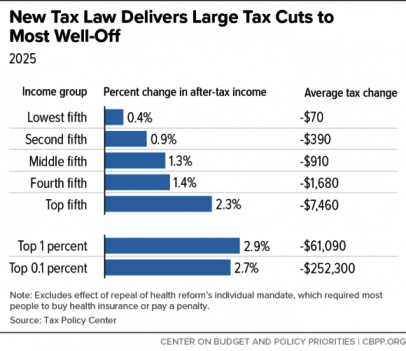 In a statement, Jared Fleisher, Quicken Loans vice president of government affairs, acknowledged Gilbert’s companies gave input to the state but said they “did not exercise any inappropriate influence.”
In a statement, Jared Fleisher, Quicken Loans vice president of government affairs, acknowledged Gilbert’s companies gave input to the state but said they “did not exercise any inappropriate influence.”
The companies “joined a wide range of stakeholders in providing feedback into the Opportunity Zone selection process,” he said. “The State of Michigan engaged interested parties, asked for their input, and encouraged participants to share the State of Michigan’s request for input with other potentially interested groups.”
Opportunity zones were created by the 2017 Trump tax code overhaul. The idea, touted by members of both parties, is to grant lucrative tax breaks to encourage new investment in poor areas around the country. The Treasury Department determined which census tracts were eligible for the special status, based on poverty and income levels, and then each state’s governor picked 25% of them as zones.
But the program has been widely criticized as a giveaway to the rich that will not bring the promised revitalization in needy areas. There is no mechanism to track the program’s results, from how much new investment comes to the zones to how many jobs it creates.
Here’s how the tax break works. Say you’re a hedge fund manager, you purchased Google stock years ago and are sitting on $1 billion in gains. If you sell, you’d send the IRS about $240 million in taxes on the capital gain, less than you’d pay in ordinary income tax but still a lot. To avoid paying that much, you could sell the shares and put the $1 billion into an opportunity zone. That comes with three generous breaks. The first is that you defer that $240 million in tax, allowing you to invest more money up front. Plus, you can hold the investment for several years and you’ll get a significant reduction in those taxes. What’s more, any additional gains from the new investment are tax-free after 10 years.
The exact value of the tax breaks for any individual will likely never be publicly known because the program has no disclosure requirements. Gilbert’s holdings, managed by his firm, Bedrock Detroit, are private.

Bedrock Detroit wall around Gilbert-owned J.L. Hudson site brags of his plans to profit from highest skyscraper development in downtown Detroit. The Shinola hotel building owned by Gilbert is at left. Photo: Clarence Tabb, Jr. Detroit News
Experts say two of the downtown Detroit tracts are islands of wealth in the city, one of the poorest in the nation. They are significantly wealthier by median income than the surrounding area. They include Gilbert-owned office space with high-end tenants including Microsoft, JP Morgan and Quicken Loans. The boutique Shinola Hotel sits in another Gilbert property that is now in one of the opportunity zones.
While the tax break is supposed to generate new development, Gilbert already has several long-planned projects located in the newly designated zones, including the construction of a glass-and-steel skyscraper on the historic Hudson’s department store site.

Gilbert at the 2017 groundbreaking of a skyscraper planned for the former site of Hudson’s department store, now in an opportunity zone. He owns so much downtown Detroit real estate, some people call it Gilbertville. (Photo: AP, file)
“These areas are not distressed,” said Conrad Kickert, an urban design academic who wrote a book about downtown Detroit. He noted that Gilbert also helped create a new streetcar line in the area, named the QLine after Quicken Loans. The area is much wealthier and whiter than Detroit as a whole, according to recent census estimates.
This year, Gilbert’s opportunity zone push has continued; his firm has been lobbying the Treasury Department on the regulations for the program, which are still being hashed out two years after the law was signed. The CEO of Bedrock sent a letter to the agency pressing the administration to adopt lax technical rules for real estate projects of the type Gilbert is pursuing, according to a copy obtained by ProPublica.
“We believe that the purpose of the [opportunity zone] legislation is best achieved through large-scale, multipurpose real estate development projects that transform and revitalize entire neighborhoods and communities,” wrote Bill Emerson of Bedrock, appearing to describe the firm’s mixed-use Monroe Blocks project. Therefore, he argued, the department should loosen the rules around how quickly opportunity zone investments have to get under way.
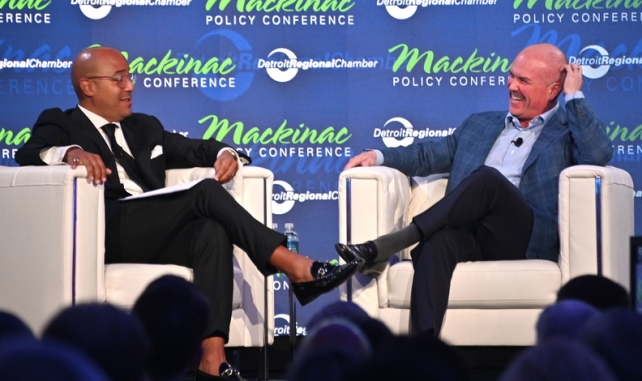
Dennis Archer Jr. (left) and Bill Emerson, Bedrock CEO, chat on the stage of the theatre at the Grand Hotel on May 29, 2019. Emerson filled in for Gilbert after he had a major stroke. Emerson claimed Gilbert empire is functioning well as he allegedly recovers. Dennis Archer, Jr.s’ role follows that of his father former Mayor Dennis Archer Sr. under Barack Obama administration. Crains Detroit Business photo
Video shows Dan Gilbert is doing better since May stroke. @cavsdan @WWJ950 @FOX2News pic.twitter.com/fTANu5XyHb
— Charlie Langton (@charlielangton) August 2, 2019
VOD: The above tweet from reporter Charlie Langton shows part of Dan Gilbert’s message to his employees on Aug. 2, 2019 after his stroke. Although the tweet claims Gilbert is doing much better, Gilbert’s speech does not seem to sync with his lip movements, as if someone else is reading his speech for him. To date (Nov. 8, 2019), nothing more has been seen of Gilbert in the media. Questions have since been raised about the ongoing progress of the development of his empire in Detroit.
Gilbert’s rise in Detroit started in 2010 when he moved the headquarters of his mortgage firm, Quicken Loans, from a suburb to struggling downtown Detroit. His companies employ more than 10,000, and his influence is so immense that Politico named him to its list of the most interesting mayors in America, the only non-mayor on the list.
Gilbert’s downtown developments have already received city and state subsidies with few strings attached, a recent Detroit Free Press investigation found. Along with myriad tax breaks, Detroit’s Downtown Development Authority, for example, sold an important lot to Gilbert for $1. (He has also been advised in his Detroit strategy by another Michigan native and prominent Trump supporter, the billionaire real estate developer Stephen Ross of Related Companies.)

Trump’s Treasury Secretary Steve Mnuchin, with new bride Louise Linton, is a former hedge fund manager and owner. Gilbert met several times with him beginning in June 2017.
As Gilbert was expanding his Detroit portfolio, Facebook billionaire Sean Parker was embracing the idea for what would become opportunity zones: give investors a tax break on their capital gains if they agree to invest the money in needy areas. Parker set up a think tank, the Economic Innovation Group, to promote the idea in Washington. In 2015, Gilbert joined the group’s “Founders Circle.”
He hasn’t spoken publicly about opportunity zones, but his real estate holdings and businesses in Detroit were clearly in areas that would be well positioned to benefit from the tax break that Parker wanted to create.
In June 2017, Gilbert met with Treasury Secretary Steve Mnuchin, the administration’s point man on the tax bill that included opportunity zones. Gilbert also had a phone call with Mnuchin, last November, according to public calendars. It’s not known what Gilbert and Mnuchin discussed. (Spokespeople for Quicken Loans and the Treasury Department declined to comment on the communications between Gilbert and Mnuchin.)
Despite his relationship with Trump and the administration, Gilbert has tried to publicly dissociate himself from the president. He is in a particularly sensitive position because Detroit is a majority African American city where Hillary Clinton beat Trump 95% to 3%. Before the event he held with Ivanka Trump in 2017, Gilbert released a statement disavowing electoral politics.
In December 2017, Trump signed the Tax Cuts and Jobs Act, which included the Economic Innovation Group’s opportunity zone idea. That prompted a scramble by state and local officials across the country to assemble nominations for the program.
By mid-February 2018, Gilbert’s lobbyists had joined the fray. They communicated with both Michigan and Detroit officials about opportunity zones, according to emails obtained by ProPublica through public records requests.
On Feb. 15, an official at the Michigan Economic Development Corporation instructed a colleague at another state agency to reach out to a lobbyist from Quicken to discuss opportunity zones.
The colleague, Brian Mills of the state housing authority, confirmed that he had a call with a representative at Quicken. The company was interested in how the state would select zones, Mills recalled. He advised the company that officials in cities like Detroit would have a lot of sway in the process.
A week later, a top economic development official in Detroit emailed maps of areas that the city wanted to nominate for the program to state officials. One of the maps reflected the input of Gilbert’s lobbyist, Jared Fleisher, who is named on the document.
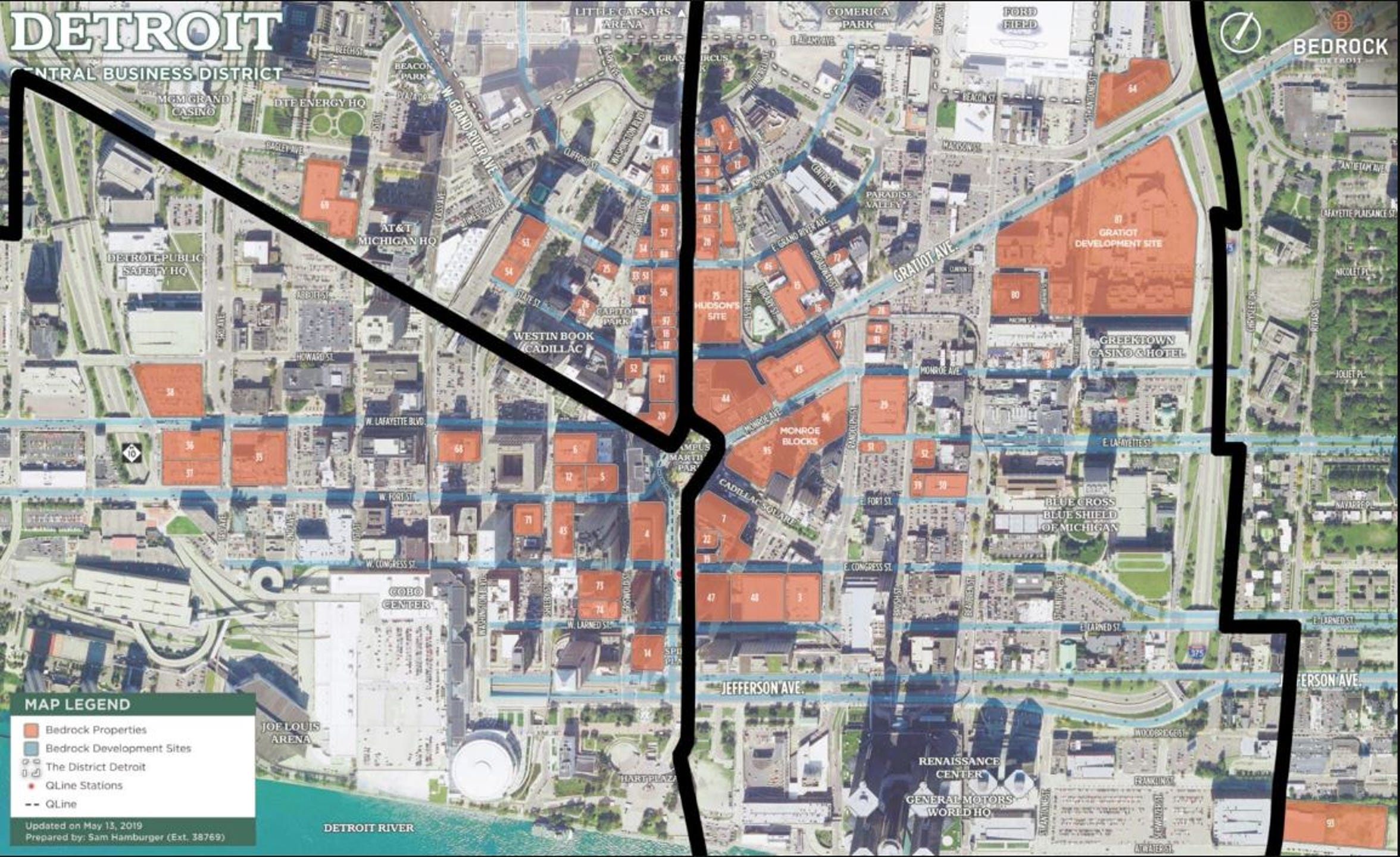
Properties owned by Gilbert’s Bedrock Real Estate (in orange) in downtown Detroit in tracts included in opportunity zones. /Map by ProPublica
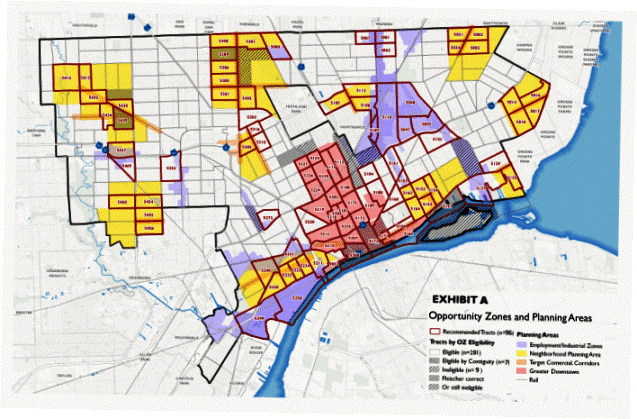
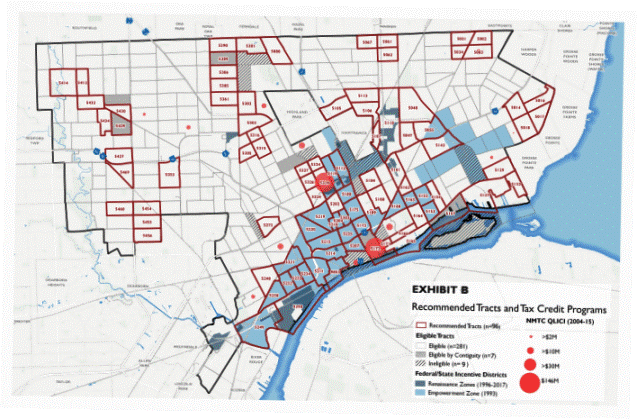 Curiously, the city’s recommendations shown on the map included a downtown tract that the Treasury Department had deemed ineligible for the program because it was too wealthy. Its median family income was almost 1 1/2 times higher than the opportunity zone eligibility requirements allowed, according to census data. Gilbert owns more than 10 buildings in the tract.
Curiously, the city’s recommendations shown on the map included a downtown tract that the Treasury Department had deemed ineligible for the program because it was too wealthy. Its median family income was almost 1 1/2 times higher than the opportunity zone eligibility requirements allowed, according to census data. Gilbert owns more than 10 buildings in the tract.
Days after the city sent the map to state officials, it proved prophetic. The Treasury Department released a revised list of eligible tracts. The downtown tract was now, for the purposes of the law, a “low-income community.”
Asked why the name of a lobbyist for Quicken Loans appeared in the legend of the map, a spokesperson for the Detroit Economic Development Corporation told ProPublica that “Jared Fleisher was just one of the experts we consulted on how the Treasury regulations worked.” She added the city “consulted with numerous experts” to assess which tracts would be eligible for the program, and that the city itself wanted the riverfront tract in the program.
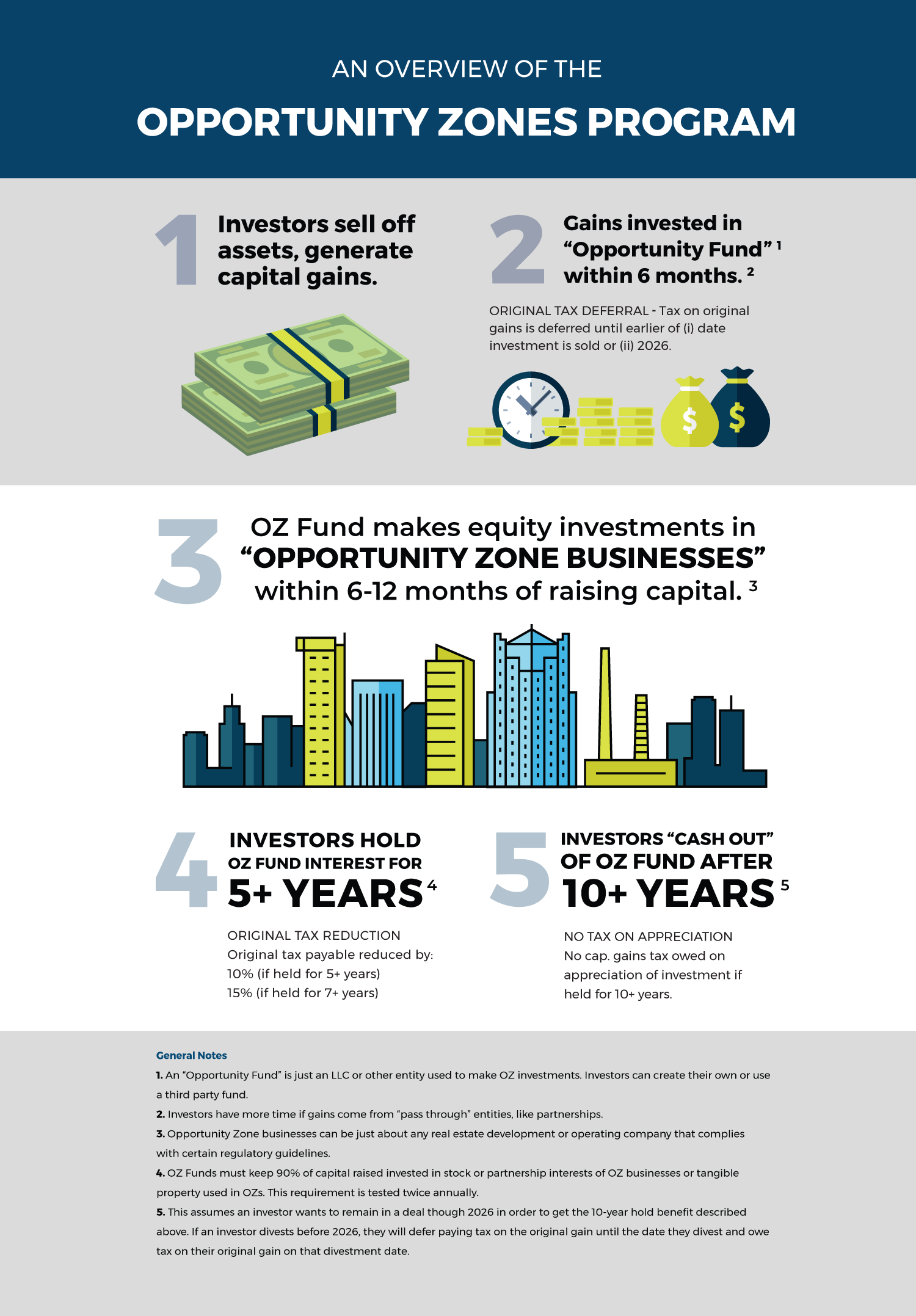 It’s not clear why Gilbert’s lobbyist believed that the tract would end up being eligible for the program. Fleisher did not answer questions on the issue but said in a statement that Gilbert’s companies had not “engaged in advocacy activities (monetary or otherwise) regarding the eligibility of certain areas.” A Treasury Department spokesman said only that “the Treasury officials that typically work on opportunity zone issues had no knowledge of this matter.”
It’s not clear why Gilbert’s lobbyist believed that the tract would end up being eligible for the program. Fleisher did not answer questions on the issue but said in a statement that Gilbert’s companies had not “engaged in advocacy activities (monetary or otherwise) regarding the eligibility of certain areas.” A Treasury Department spokesman said only that “the Treasury officials that typically work on opportunity zone issues had no knowledge of this matter.”
In a statement, Fleisher declined to comment on the nature of his interactions with the city, but he told ProPublica, “Ultimately, the City of Detroit — not (Gilbert’s) Rock Family of Companies or any other respondent to the open call for comments — made the recommendations to the state about which census tracts in Detroit should be selected.”
Two weeks after the Treasury Department issued its revision, the city recommended the tract for the program, along with several others in which Gilbert had substantial investments. They did so even though those tracts were not included in a list of recommendations for Detroit that the Michigan State Housing Development Authority had assembled and shared with the city.
In the end, the state deferred to the city, and in April 2018, the downtown tracts in which Gilbert had poured so much capital officially became opportunity zones.
An analysis by ProPublica found that one of the tracts only became eligible through a provision in the law that was intended to allow areas that had been designated for a Clinton-era anti-poverty measure to be included in the program. However, experts told ProPublica that the Treasury Department’s mapping analysis was deeply flawed, and that it erroneously allowed a handful of areas to become opportunity zones. As ProPublica previously reported, a similar loophole allowed a tract largely owned by Kevin Plank, billionaire CEO of Under Armour, to take advantage of the opportunity zone program for his development in Baltimore.
Community groups in Michigan have criticized the selection process, contending it favored wealthier areas that are already seeing redevelopment at the expense of more impoverished areas of Detroit. Of the 10 most impoverished areas in the city that the governor could have picked, only two made the cut. Of the 10 least impoverished areas, six were picked. Those include downtown tracts in which Gilbert has substantial investments.
Former Gov. Rick Snyder, who made the ultimate selections last year, declined to comment.
In an email, a spokesperson for the city of Detroit said its recommendations centered on areas where investors could make a return. “The City recommended the eligible areas where it believed developers were most likely to find profitable investments. To do anything else would have been pointless under the opportunity zone law.”
Jeff Ernsthausen is a data reporter at ProPublica. Contact him at jeff.ernsthausen@propublica.org.
Justin Elliott is a ProPublica reporter covering politics and government accountability. Contact him at justin@propublica.org or via Signal at (774) 826-6240.
ProPublica is an independent, nonprofit newsroom that produces investigative journalism for use by other media outlets. Sign up for ProPublica’s Big Story newsletter to receive stories like this one in your inbox as soon as they are published.
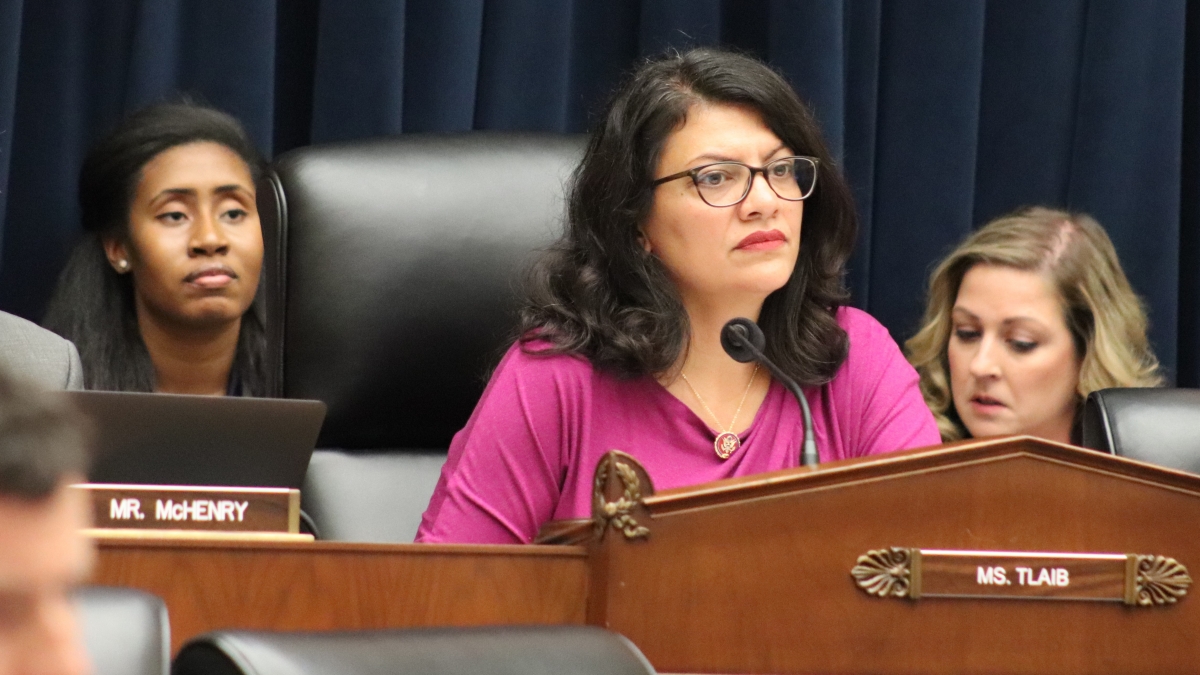
U.S. Representative Rashida Tlaib (D) Detroit/Official website photo
CONGRESSWOMAN RASHIDA TLAIB ASKS FOR INVESTIGATION ON OPPORTUNITY ZONES
Rep. Tlaib Request Comes After Findings Of Billionaire Involvement In Selection Of Opp. Zones
November 7, 2019
Press Release
DETROIT – Congresswoman Rashida Tlaib (MI-13) sent a letter to the chairmen of the House Committee on Ways and Means, Committee on Oversight and Reform Subcommittee on Economic and Consumer Policy, and the Committee on Financial Services Subcommittee on Oversight and Investigations to request they hold investigative hearings into whether political campaign contributions influenced the designation of opportunity zones in her district and across the country.
Opportunity zones were created by the Tax Cuts and Jobs Act of 2017 supposedly to encourage new investments in poor areas by providing tax breaks to investors.
The request comes after a ProPublica article published in October showed that opportunity zones were created in areas that did not meet the legal criteria, at least in part thanks to lobbying by billionaire developers and political donors. For example, an opportunity zone in downtown Detroit did not meet the poverty requirement to be designated an opportunity zone and is in an area into which billionaire Dan Gilbert has poured billions for real estate. Dan Gilbert’s Quicken Loans company also donated $750,000 to President Trump’s inaugural fund, and the ProPublica article details Quicken lobbyists interacting with city, state, and federal officials in pursuit of an opportunity zone designation.
“This is yet another example of how corporate greed and the influence of billionaires have infected our government like a disease,” said Rep. Tlaib. “Residents in my district have witnessed time and time again how the desires of wealthy individuals are put before their needs—enough is enough. This is not how our government, or our democracy should work. We must take action to uncover the truth.”
ProPublica’s reporting also found unqualified census tracts designated as opportunity zones in Baltimore, Philadelphia, and Oklahoma. In Baltimore, for example, an opportunity zone was designated in an area where billionaire Under Armor CEO Kevin Plank and Goldman Sachs plan heavy investments, despite that area not meeting poverty requirements and only being designated an opportunity zone on a technicality after developer lobbying efforts.
“Public trust in our federal government is eroded when the rules are applied unevenly and seem to reward the wealthiest and best connected amongst us,” said Rep. Tlaib in the letter. “It appears that a tax program supposedly designed to benefit the poorest amongst us is now being used to reward political donors and wealthy investors.”
The letter was sent to Chairman Richard Neal (Committee on Ways and Means), Chairman Al Green (Subcommittee on Oversight and Investigation), and Chairman Raja Krishnamoorthi (Economic and Consumer Policy). It can be viewed here.
Related stories:
https://www.businessinsider.com/dan-gilbert-detroit-properties-bedrock-map-2018-8





Hi – Thank you SOOOOOO much for your reporting. I’ve heard Bankole Thompson talk on 910am about a $600 million ‘over taxing’ (my term) of Detroit residents. Just wondering if you’ve written about this? Trying to find more info. Thanks again, Libby Hunter, zetlir@gmail.com (my alias is gormatthews@gmail.com and assist Rev. Pinkney)